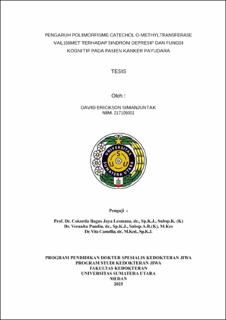Pengaruh Polimorfisme Catechol O-Methyltransferase VAL158MET Terhadap Sindrom Depresid dan Fungsi Kognitif Pada Pasien Kanker Payudara
The Effect of Catechol O-Methyltransferase VAL158MET Polymorphism on Depressive Syndrome and Cognitive Function in Breast Cancer Patients

Date
2024Author
Simanjuntak, David Erickson
Advisor(s)
Amin, Mustafa Mahmud
Husada, M Surya
Metadata
Show full item recordAbstract
Abstract: Women with breast cancer confront a variety of potential cancer triggers, including hormonal and environmental variables. Mood disorders such as depression and cognitive function problems are tightly linked in breast cancer patients. Genetics has been a key focus of research into the role of genetics in impacting diseases. Methods: Samples were collected at Adam Malik Hospital's oncology outpatient clinic and selected via interviews based on the researcher's criteria and assessment (purposive sampling). A 4-cc blood sample was collected and underwent Polymerase Chain Reaction (PCR) then taking PHQ-9 questionnaire data and Trail Making Test data. The collected data was processed using SPSS (Statistical Package for the Social Sciences) version 29. Results: The variant genotype and polymorphism allele Val158Met alter cognitive function (p=0,001), with the met/met genotype having an 8 times greater (OR=8,929) (95% CI= 2,303–34,609)) chance of experiencing cognitive function issues in the examined population, in line with test revealed a significant connection between the COMT polymorphism allele and cognitive function (p= 0.035). The genotype variation (p=0.631) and allele (p= 0.747) of the COMT Val158Met polymorphism have no significant link with depression syndrome. The average age of the patients in this study is 59.2 years, ranging from 47 to 65. The vast majority of patients in this study were married (98.3%). 34.2% of the patients had a family history of cancer. The Val/Val variant was discovered to be the most common (61.7%), and the depression syndrome evaluation using the PHQ-9 questionnaire yielded an average score of 5. Conclusion: Overall, the results of the analysis show that the Met allele of the COMT Val158Met polymorphism is strongly related to cognitive dysfunction in breast cancer patients, highlighting the necessity of including this genetic variant in patient cognitive assessments. Alleles that differ from the same gene can alter how the brain functions by influencing neurotransmitters, receptors, and metabolic pathways. This variant can affect cognitive ability. Unlike mood disorders, the likelihood in this study's sample is low, presumably due to the existence of social support elements such as family and other support groups that help breast cancer patients cope with their psychological burden.
Collections
- Master Theses [164]
